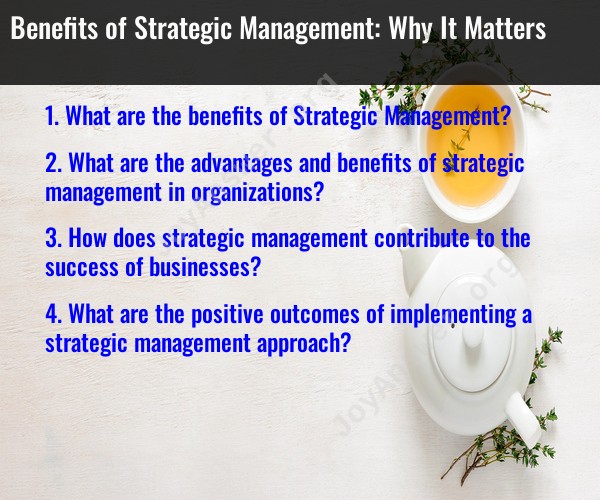What are the benefits of Strategic Management?
Strategic management is a vital process for organizations that involves setting goals, making informed decisions, and allocating resources to achieve those goals. There are numerous benefits associated with strategic management. Here are some of the key advantages:
Clear Direction and Purpose: Strategic management helps organizations define their mission, vision, and core values. It provides a clear sense of purpose, guiding employees and stakeholders toward common goals.
Alignment of Resources: Strategic management ensures that resources, including financial, human, and technological resources, are allocated efficiently to support the organization's strategic objectives.
Improved Decision-Making: It provides a structured framework for making informed decisions. By analyzing internal and external factors, organizations can make data-driven choices that are in line with their long-term goals.
Competitive Advantage: Strategic management helps organizations identify their strengths and weaknesses and exploit opportunities while mitigating threats. This leads to a sustainable competitive advantage in the marketplace.
Adaptability: Through strategic planning and monitoring, organizations can adapt to changing market conditions, industry trends, and emerging technologies. This flexibility is crucial for long-term success.
Innovation and Creativity: It encourages innovation and creative thinking as part of the strategic process. Organizations that focus on strategic management often come up with innovative solutions to address challenges.
Effective Resource Management: It allows organizations to prioritize and allocate resources to projects and initiatives that offer the highest return on investment, leading to cost savings and improved efficiency.
Accountability: Strategic management establishes accountability by setting clear goals and performance metrics. This enables employees and teams to measure their progress and take responsibility for their contributions to the organization's success.
Long-Term Focus: Instead of reacting to short-term issues, strategic management emphasizes a long-term perspective. It helps organizations look beyond immediate challenges and plan for the future.
Enhanced Communication: The strategic management process involves communication and collaboration across all levels of the organization. This fosters a shared understanding of objectives and encourages transparency.
Risk Mitigation: Organizations can proactively identify and mitigate risks through strategic management. By assessing potential risks and developing contingency plans, they are better prepared to navigate challenges.
Increased Organizational Performance: The systematic approach to strategic management typically leads to improved overall organizational performance, as it aligns various aspects of the organization with its strategic goals.
Stakeholder Satisfaction: By focusing on strategic management, organizations can better meet the needs and expectations of stakeholders, including customers, employees, investors, and the community.
Measurable Results: Organizations can measure the success of their strategies through key performance indicators (KPIs) and metrics. This enables them to track progress and adjust strategies as needed.
Competent Leadership: Effective strategic management often requires strong leadership and decision-making skills. It cultivates leadership capabilities within the organization.
Increased Sustainability: Strategic management can lead to more sustainable business practices by considering environmental, social, and ethical factors in decision-making.
Enhanced Reputation: A well-executed strategic management approach can improve an organization's reputation, leading to increased trust and credibility among stakeholders.
In summary, strategic management is essential for organizations to navigate the complex and dynamic business environment. It provides a structured framework for setting objectives, making informed decisions, and achieving long-term success. The benefits of strategic management extend to all aspects of an organization, from its financial performance to its overall effectiveness and reputation.
What are the advantages and benefits of strategic management in organizations?
Strategic management is the process of setting organizational goals and developing plans to achieve them. It is an essential part of any successful organization, as it provides a framework for making decisions and allocating resources.
There are many advantages and benefits of strategic management, including:
- Improved performance: Strategic management can help organizations to improve their performance by focusing on their strengths and opportunities, and by developing strategies to mitigate their weaknesses and threats.
- Increased competitiveness: Strategic management can help organizations to become more competitive by developing unique selling propositions and by differentiating themselves from their competitors.
- Enhanced decision-making: Strategic management provides a framework for making informed decisions about the future of the organization.
- Improved communication and coordination: Strategic management can help to improve communication and coordination within the organization by aligning everyone around a common set of goals.
- Increased employee morale and engagement: Strategic management can help to increase employee morale and engagement by giving employees a sense of purpose and direction.
How does strategic management contribute to the success of businesses?
Strategic management contributes to the success of businesses by helping them to:
- Define their mission and vision: Strategic management helps businesses to define their mission and vision, which are the foundation of their success.
- Set clear goals and objectives: Strategic management helps businesses to set clear goals and objectives, which provide a roadmap for their future development.
- Develop strategies to achieve their goals: Strategic management helps businesses to develop strategies to achieve their goals, which involve allocating resources and making decisions.
- Monitor and evaluate their progress: Strategic management helps businesses to monitor and evaluate their progress towards their goals, which allows them to make adjustments as needed.
By following these steps, businesses can use strategic management to achieve their goals and objectives, which ultimately leads to success.
What are the positive outcomes of implementing a strategic management approach?
The positive outcomes of implementing a strategic management approach include:
- Improved financial performance: Studies have shown that businesses that implement strategic management tend to perform better financially than those that do not.
- Increased customer satisfaction: Strategic management can help businesses to better understand their customers and to develop products and services that meet their needs. This can lead to increased customer satisfaction and loyalty.
- Improved employee morale and engagement: Strategic management can help businesses to create a more positive work environment and to engage their employees in the decision-making process. This can lead to increased employee morale and productivity.
- Enhanced innovation and creativity: Strategic management can help businesses to foster a culture of innovation and creativity. This can lead to the development of new products and services, and to new ways of doing business.
- Increased resilience: Strategic management can help businesses to become more resilient in the face of change and uncertainty. This is because strategic management forces businesses to think about their future and to develop strategies to mitigate risks.
Overall, strategic management is a valuable tool that can help businesses to achieve their goals and objectives, and to become more successful.


